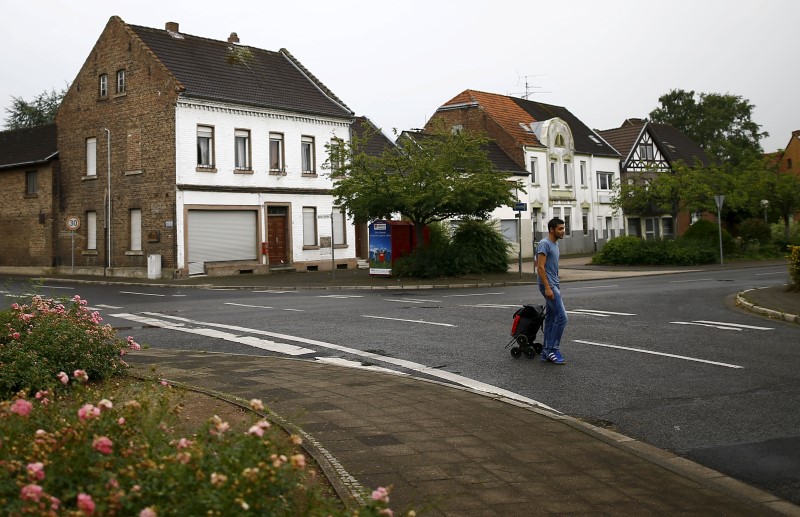By Erik Kirschbaum
KERPEN-MANHEIM, Germany (Reuters) - Arson attacks and unruly protests against the 450,000 refugees crowding into Germany this year have dominated the headlines as the country struggles to cope with a record-breaking influx of asylum-seekers fleeing war, violence and famine.
But there is another story in Germany that is getting far less attention:
The millions of Germans who are opening their hearts and homes to help the tired, poor and huddled masses from the Middle East, Asia and Africa find shelter and perhaps a new life in a country that won't stop trying to atone for its Nazi past.
The tensions between opponents and helpers of refugees in Germany, which is taking in more than any other European Union nation, is a microcosm of the struggles over the issue dividing Europe and especially at the flashpoint of violence in Calais.
This veritable German ghost town of Kerpen-Manheim - all but abandoned after utility RWE bought it to tear it down for a future 400-meter deep open-pit mine - has become a temporary home for 80 refugees from Somalia, Kosovo, Albania and Bosnia.
Local authorities rented some of the condemned buildings from RWE to shelter refugees until their cases can be examined, a process that can take months or even years. It is one of the myriad of creative solutions Germans have come up with to handle the crush of refugees – twice as many as the 200,000 last year.
ARSONISTS VS HELPERS
"It's always small numbers of extremists setting fires who get the attention," community leader Wolfgang Esser told Reuters in Kerpen-Manheim, where most of the 1,000-year-old town's 1,600 residents have already left the shuttered red-brick buildings.
"But the truth is that there are lot more people in Germany working against the arsonists and anti-refugee protesters. There are a lot more people in Germany eager to help refugees."
One of the countless unsung volunteers in Germany, Esser has been collecting furniture, clothing and household goods donated by other Germans to distribute to refugees. He also organizes youth soccer and sports for the children of the newcomers.
"Sport is the best vehicle for integration," he said, noting some volunteers are teaching refugees German while others here help them deal with the maze of German bureaucracy.
The sight of asylum-seekers laughing, riding bicycles or waiting for a rare bus on the tidy if empty streets of Kerpen-Manheim mark a striking contrast to scenes of smoldering, burned out refugee centers in towns such as Troeglitz and Remchingen.
Some 150 newly erected shelters have been attacked, damaged or destroyed this year - often by arsonists bent on keeping refugees from being sheltered in new quarters in their towns. Swastikas were painted on one shelter that was burned out in Vorra.
"We've seen the number of attacks on refugee housing rise considerably over the past year and we're concerned that this number will continue to increase," Hans-Georg Maassen, head of the government's domestic security BfV agency, told Reuters. "We've also seen the propensity to turn to violence rise."
Maassen said the far-right is trying to whip up fears about Germany being over-run by foreigners in a bid to revive its own fading fortunes.
"We've seen the far-right extremists on the wane for years," he said. "They're trying to exploit the refugee situation to become politically relevant again."
GERMANY A HAVEN FOR REFUGEES
Germany has a long tradition of welcoming refugees, in part a response to its Third Reich past when 500,000 Jews and others persecuted by the Nazis fled. They found shelter in more than 80 countries. After World War Two, Germany took in some 13 million displaced persons and refugees fleeing west from Eastern Europe.
Another 1.8 million ethnic Germans from Russia and Kazakhstan have moved to Germany since 1990 as well.
"It's not a problem at all that refugees are coming in - they're all welcome here," said Rafael Massimo, 18, one of the few hundred locals still in Kerpen-Manheim, near ex-Formula One champion Michael Schumacher's home town and west of Cologne.
"There are enough empty houses and anyone who needs a place can come here," he added.
Johannes Lambertz, a 49-year-old carpenter who donated furniture from his parent's vacated house, said helping was "obviously the right thing to do."
"The only trouble is that there are no shops left here. They have to take a bus to get anything."
Just as hostility to refugees can take many forms - from skinheads shouting abuse to the middle classes complaining about the affect on house prices - support for them also comes in a myriad of ways.
Hannelore Kraft, the state premier of Germany's biggest state, North Rhine-Westphalia, said 150 civil servants had come out of retirement to help refugees get settled and protected.

In Hanover, a bishop set up a small flat next to his office now used by two refugees from Afghanistan. In Berlin, an elderly couple took in a 37-year-old man from Ghana. And a 20-year-old who fled Afghanistan after the Taliban decapitated his brother overcame his fear of water to become a lifeguard in Munich.